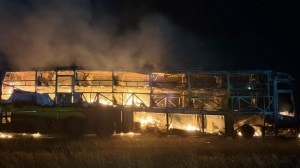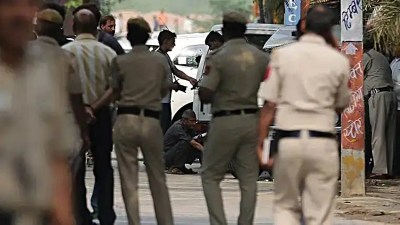Around Town: How a Parsi gentleman’s craving for good coffee gave Mumbai’s art district its Kala Ghoda Cafe — now a hub for artists, writers, tourists
Kala Ghoda Cafe was opened in 2009 as part of a personal desire of Farhad Bomanjee, a mechanical engineer who had worked across the US and Europe before returning to Mumbai to join his family business.
 The cafe, which opened its doors in 2009, emerged partly from the personal desire of Farhad Bomanjee (Express photo by Ganesh Shirsekar)
The cafe, which opened its doors in 2009, emerged partly from the personal desire of Farhad Bomanjee (Express photo by Ganesh Shirsekar)In the heart of Mumbai’s art district, surrounded by galleries and colonial facades, stands a space that has quietly shaped how the city drinks its coffee and how it connects with one another — Kala Ghoda Cafe.
The cafe, which opened its doors in 2009, emerged partly from the personal desire of Farhad Bomanjee, a mechanical engineer who had worked across the US and Europe before returning to Mumbai to join his family business, and found himself craving a good cup of coffee. “I wanted a place where I could have a cup of coffee the way I like it — simple, no fuss,” he said.
At the time, chain cafes were just about taking over Mumbai, but none offered what Bomanjee was looking for — warmth, conversation, and a sense of calm. So when the tenants of a small ground-floor space in his family’s Kala Ghoda building moved out, he decided to turn it into a 16-seater cafe with six tables, serving four kinds of coffee, two sandwiches, and a couple of cakes.
“If 20 people came in a day, I was happy,” Bomanjee, 52, recalled of those early days.
Within months, though, Kala Ghoda Cafe had become a neighbourhood fixture — a spot where lawyers from the nearby courts, artists from Jehangir Art Gallery, and stockbrokers from Dalal Street all stopped by for a break.
The café’s signature was its unpretentious charm — wooden tables, white walls, and always, a small piece of dark chocolate served with coffee. “I like dark chocolate with my coffee. It’s a nice experience, a bit like eating cheese with wine,” Bomanjee said.
He sourced beans from organic plantations in Coorg and Tamil Nadu, such as Mojo and Balmaadi, long before “farm-to-cup” became cafe speak.
“The coffee had to be smooth, not burnt, and served at the right temperature,” he said. But for him, the café was never just about coffee. “It was about the atmosphere. A clean, nicely designed space with some art on the walls,” he said.
Art was woven in from the start. A photography enthusiast himself, Farhad began by putting up his own pictures, later inviting other artists to showcase their work.
Over the years, the cafe’s walls have featured an ever-changing rotation of photographs by Puja Vaish, Kristian Haggblom, Nachiket Pimprikar, PAT, and Hemant Chaturvedi, among others — mirroring the creative pulse of the neighbourhood.
From a single-shift cafe running 9 am to 5 pm, Kala Ghoda Cafe today operates from 8 am to midnight on weekdays, and till 1.30 am on weekends. Its footprint has expanded too — from 16 seats to 90 covers across 1,500 sqft — now housing three distinct spaces: the front cafe, a dining room opened in 2015, and a wine bar added in 2018.
“The dining room came because people wanted more food. They loved the sandwiches and cakes but asked for salads and lunch options,” said Bomanjee. Soon came the wine bar, a cosy evening counterpart to the cafe’s sunlit days.
 As for what’s next, Farhad prefers evolution over expansion.
As for what’s next, Farhad prefers evolution over expansion.
“Not everyone wants coffee and cake at night. A wine bar lets people hang out without having to eat a big meal.”
The wine list — personally tasted and curated — runs from Rs 550 a glass to Rs 22,000 a bottle. The menu across the spaces blends Parsi and European comfort food: pesto cheddar grilled sandwich, grilled chicken, and vegan curry. “Wholesome food that fits the space,” he said.
Design remains close to his heart. “The idea was never to transform the building but to show off its bones. To do justice to the architecture of the space,” Bomanjee said. The front room celebrates the old Fort area’s heritage; the dining room carries traces of memory and nostalgia. Furniture has been sourced from antique markets and restored; the women’s washroom gleams with striking green tiles, and the men’s with grey ceramic ones, Bomanjee “fell in love with.”
The vibe — half gymkhana, half arthouse — is something he didn’t plan but fully embraces. “Someone once told me, this feels like a gymkhana, but it’s not, because it’s open to everyone. And that’s exactly what I wanted — a place where people share tables, meet by chance, and say hello before moving on,” he said.
The crowd remains as eclectic as ever — lawyers, artists, students, tourists, and regulars who stop by for their daily coffee or a quiet glass of wine. “That mix, that’s what keeps it alive,” Bomanjee said. “You’re not just putting people of one kind together.”
As for what’s next, Farhad prefers evolution over expansion. “We don’t have growth plans,” he said. “We just want to keep it relevant. To do that, you have to keep changing — in order to stay the same.”
Now, the cafe makes its own ice creams and pastas, each dish staying true to the idea of being “fully from here.” Because for Bomanjee, the soul of Kala Ghoda Café lies not in growth, but in craft — and in keeping that small, human experience of coffee intact, even as the city outside keeps changing.







